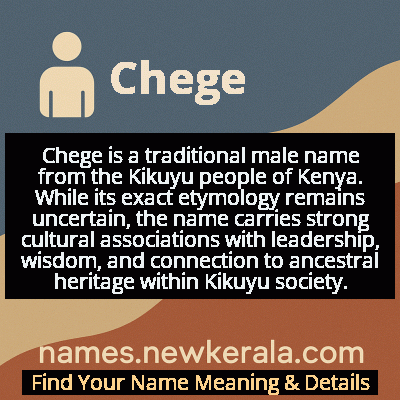Chege Name Meaning & Details
Origin, Popularity, Numerology Analysis & Name Meaning of Chege
Discover the origin, meaning, and cultural significance of the name CHEGE. Delve into its historical roots and explore the lasting impact it has had on communities and traditions.
Name
Chege
Gender
Male
Origin
African
Lucky Number
1
Meaning of the Name - Chege
Chege is a traditional male name from the Kikuyu people of Kenya. While its exact etymology remains uncertain, the name carries strong cultural associations with leadership, wisdom, and connection to ancestral heritage within Kikuyu society.
Chege - Complete Numerology Analysis
Your Numerology Number
Based on Pythagorean Numerology System
Ruling Planet
Sun
Positive Nature
Leaders, ambitious, highly driven, self-reliant, innovative.
Negative Traits
Overly aggressive, domineering, impatient, selfish.
Lucky Colours
Red, orange, gold.
Lucky Days
Sunday.
Lucky Stones
Ruby, garnet.
Harmony Numbers
2, 3, 9.
Best Suited Professions
Entrepreneurs, managers, engineers.
What People Like About You
Courage, determination, leadership.
Famous People Named Chege
Chege Kibachia
Trade Unionist and Political Activist
Pioneering labor organizer who led significant workers' movements in colonial Kenya
Chege Mbitiru
Journalist and Author
Renowned Kenyan journalist and writer known for his contributions to East African media
Chege Gakumo
Business Leader
Prominent entrepreneur and business executive in Kenya's corporate sector
Chege Njoroge
Academic and Researcher
Distinguished scholar in African studies and cultural preservation
Name Variations & International Equivalents
Click on blue names to explore their detailed meanings. Gray names with will be available soon.
Cultural & Historical Significance
The name Chege is particularly notable for its association with leadership and wisdom in Kikuyu oral traditions. Historical figures bearing this name were often respected elders, warriors, or community leaders who played crucial roles in maintaining social order and cultural practices. The name embodies the Kikuyu principles of responsibility, community service, and the preservation of cultural knowledge, making it a name that carries expectations of honor and respect within the community.
Furthermore, Chege represents the resilience of Kikuyu cultural identity through periods of social change and modernization. The continued use of this traditional name demonstrates the enduring importance of cultural heritage in contemporary Kenyan society, serving as a marker of ethnic identity and cultural pride that transcends generational boundaries.
Extended Personality Analysis
Individuals named Chege are typically perceived as natural leaders with strong character and determination. They often exhibit qualities of reliability, wisdom beyond their years, and a deep sense of responsibility toward their family and community. These traits align with traditional Kikuyu values that emphasize the importance of contributing to collective well-being and upholding cultural traditions.
Chege is often associated with practical intelligence, resilience, and the ability to navigate complex social situations with grace. Those bearing this name are expected to demonstrate emotional stability, good judgment, and the capacity to mediate conflicts. The name carries an implicit expectation of maturity and the ability to provide guidance to others, reflecting the Kikuyu cultural ideal of the wise elder who maintains harmony within the community through thoughtful leadership and cultural knowledge.
In social contexts, people named Chege are often seen as dependable and trustworthy individuals who value integrity and honor. They tend to approach life with seriousness of purpose while maintaining a warm, approachable demeanor. The cultural weight of the name often inspires those who bear it to live up to its associated virtues of strength, wisdom, and community commitment, creating a self-reinforcing cycle where the name shapes the personality and the personality honors the name.
Modern Usage & Popularity
In contemporary Kenya, Chege remains a popular name that bridges traditional heritage with modern identity. While maintaining its strong cultural roots, the name has adapted to urban settings and is commonly used among educated, professional Kikuyu families. Its usage reflects a conscious preservation of cultural identity while participating fully in modern Kenyan society. The name continues to be favored for its distinctive cultural resonance and the positive attributes it conveys, though it faces some competition from more international names in urban areas. Recent trends show a renewed interest in traditional names like Chege as younger generations seek to reconnect with their cultural heritage, making it both a traditional choice and a contemporary statement of cultural pride.
Symbolic & Spiritual Meanings
Symbolically, Chege represents the continuity of Kikuyu cultural traditions and the transmission of ancestral wisdom across generations. The name embodies concepts of stability, rootedness, and connection to one's heritage. It symbolizes the bridge between past and present, carrying forward the values and experiences of previous generations while adapting to contemporary realities. In metaphorical terms, Chege represents the enduring strength of cultural identity and the responsibility of preserving one's heritage in a changing world. The name also symbolizes the ideal of community leadership and the importance of maintaining cultural integrity while engaging with modern global influences, serving as a reminder that cultural preservation and progress are not mutually exclusive but can coexist harmoniously.

